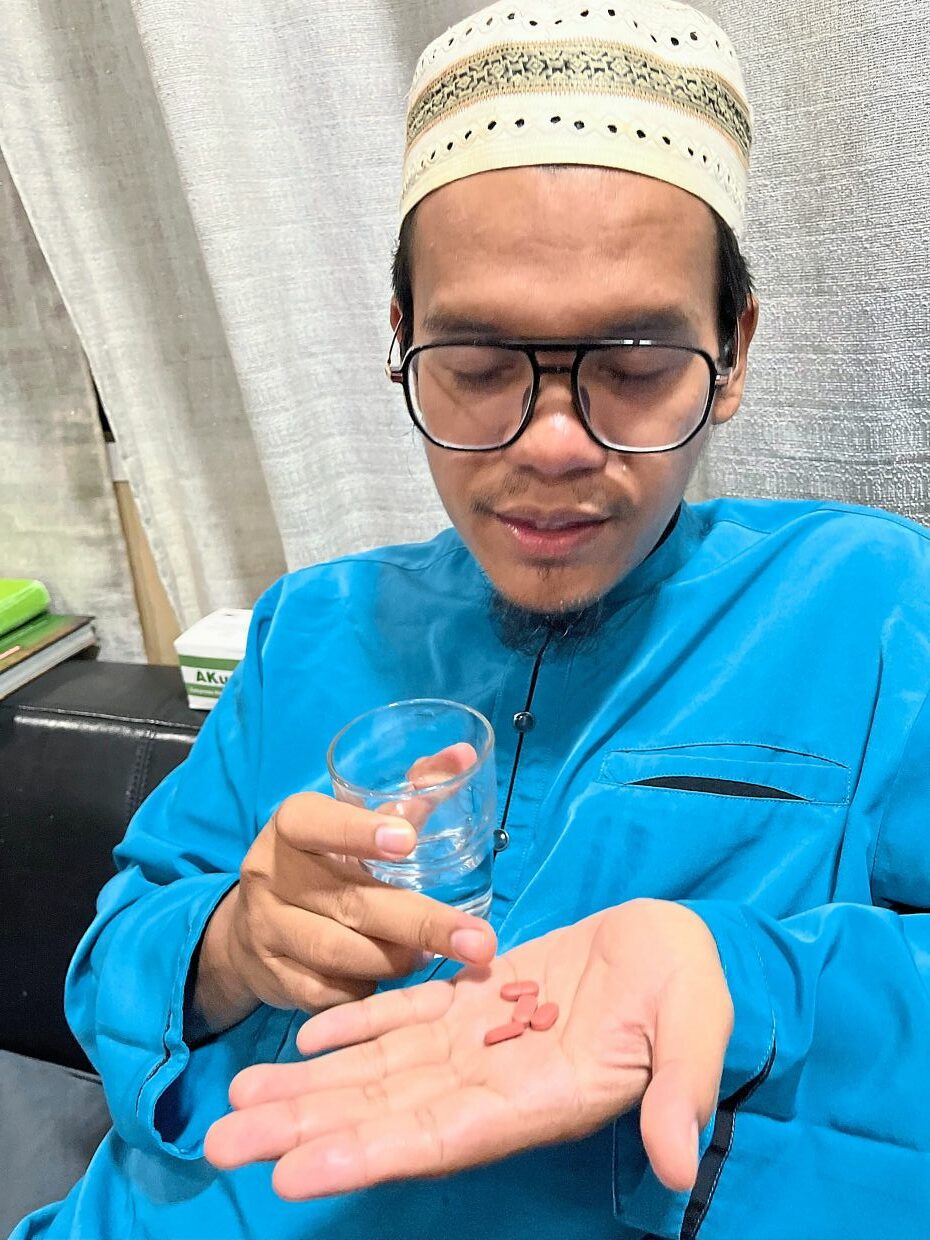A man’s fight against tuberculosis
(ANN/THE STAR) – In September 2023, senior lecturer Dr. Mohd Usman Mohd Junaidi’s life took an unexpected turn when he was plagued by a nightly low-grade fever that persisted for two months.
At 36, and considering himself relatively healthy despite minimal exercise and being a non-smoker, he initially attributed the fever to work-related stress, intensified by recent administrative responsibilities at his workplace.
Despite multiple negative Covid-19 tests, Dr. Mohd Usman’s health continued to deteriorate. What began as a dry cough escalated into coughing up phlegm, and eventually, blood.
His visit to a general practitioner (GP) led to a prescription for antibiotics, but his condition only worsened, marked by swollen lymph nodes and an unexplained eight-kilogramme weight loss.
Recognising the severity of his symptoms, Dr. Mohd Usman sought the expertise of an ear, nose, and throat (ENT) specialist. After a battery of tests and a thorough analysis of his phlegm, the diagnosis was grim: tuberculosis (TB) of the lung.

“I was shocked,” admits Dr Mohd Usman.
He has no idea where, when or how he picked up this infectious disease.
He says: “Perhaps it was from a colleague who had TB sometime back, but I never talked or mingled with him.
“Or it could have been from my brother, who was diagnosed with TB in 2022, although I only visited him a few times, with a mask on.
“I really don’t know, but thankfully, I was detected early.”
Dr Mohd Usman was referred to the Directly Observed Therapy, Short-course (DOTS) clinic at Universiti Malaya Medical Centre (UMMC), Kuala Lumpur, to commence treatment immediately.
At this clinic, patients make daily visits to take their medicines from a trained healthcare worker, who provides the prescribed TB drugs and watches the patient swallow every dose.
This is to ensure that the patient is not only taking the drugs (especially vital in combating drug-resistant TB), but also that they are taking them in the right combinations for the correct duration of time.
When the healthcare worker is confident treatment can be adhered to at home, they will appoint a family member to keep tabs on the patient.
Upward trend
TB is caused by the bacteria Mycobacterium tuberculosis, which spreads through the air. The bacteria most often settle in the lungs and grow.
From there, they can move through the blood to other parts of the body, such as the kidneys, spine and brain.
TB in the lungs or throat can be infectious, while TB in other parts of the body is usually not infectious.

When people with lung TB cough, sneeze or spit, they propel the bacteria into the air. If another person inhales even a few of these germs, he can become infected.
However, not everyone becomes sick as the majority of people are able to fight the bacteria and stop them from growing, although they may still be present in the body.
This is known as a latent TB infection where the bacteria remains dormant and cannot spread to others.
But in people who have a weak immune system, such as smokers or those with HIV (human immunodeficiency virus), diabetes or malnutrition, the bacteria become active, multiply and cause disease.
In many countries, including Malaysia, TB disease is back on the rise. According to the Health Ministry, Malaysia recorded 26,781 TB cases last year (2023) – a 5.47 per cent increase from the 25,391 cases reported in 2022.
When someone develops TB disease, the symptoms may be mild for many months. This can lead to delays in seeking care and results in transmission of the bacteria to others.
TB symptoms include:
- A cough that lasts three weeks or longer
- Pain in the chest
- Coughing up blood or sputum
- Weakness or fatigue
- Weight loss
- Loss of appetite
- Chills
- Fever
- Night sweats.
Once Dr Mohd Usman discovered he had TB, he quickly isolated himself in a room as he was told he would be contagious for up to three weeks into his course of treatment. He also sent his wife and three kids for TB screening.
All tested negative, much to his relief.

The World Health Organisation (WHO) estimates that people with TB disease can infect up to 10-15 other people through close contact over the course of a year.
Without proper treatment, up to two-thirds of people with TB disease will die. The vast majority of TB cases can be cured when medicines are provided and taken properly.
Treatment usually involves taking a course of four antimicrobial drugs for six to nine months.
If patients stop taking antibiotics before completing the course or skip a dose, the bacteria may become resistant to the antibiotics.
This is potentially serious because TB then becomes difficult to treat and will require a longer course of treatment with different, and possibly more toxic, therapies.
Road to recovery
In Dr Mohd Usman’s case, he had to take five tablets (a combination of four drugs) at the same time daily for the first two months.
“How many tablets you take is dependent on your body weight.
“At the beginning, my wife would monitor that I was taking the medications as directed, as I cannot skip or miss a dose, or I’d have to start all over again.
“I was on medical leave for six weeks and didn’t see a difference in my condition until the second month when my cough got a bit better.”
Now that he has gotten into a routine, he diligently takes his medicines in the morning – without his wife’s supervision – as he’s determined to recover.
He recollects: “When I was in isolation, it was a very lonely period as I couldn’t hug my kids or be with them.
“We had to tell them I had an infectious disease and to stay away if they didn’t want to be infected. When I was out of isolation, I still wore a mask and would sanitise all the places I had been to in the house.
“I started questioning many things in my mind. Maybe my disease was more serious than I thought or maybe I wasn’t handling stress well.
“I had to motivate myself to get better and that meant taking the medications as prescribed. Now I’m still taking five tablets daily, but each tablet has a combination of two drugs.”

These days, Dr Mohd Usman spends more time with his young children, eats healthier (and on time), and has started jogging to keep fit and strengthen his immune system.
“My CT [computed tomography] scan last month showed my lungs were better, and just before Hari Raya Puasa (Apr 10, 2024), I’ll do some tests to see if I need to extend my treatment beyond six months.
“My cough is gone and my weight is back to 80kg,” he says.
The anxiety of contracting TB still plays in his mind and whenever someone coughs, Dr Mohd Usman is the first to run away!
“I’m not out of the woods yet, and yes, I’m scared it could be a TB cough – I don’t want to go through this journey again.”







